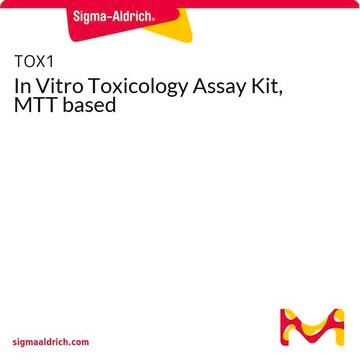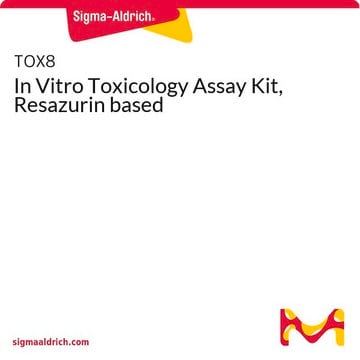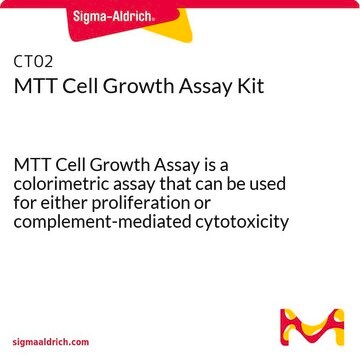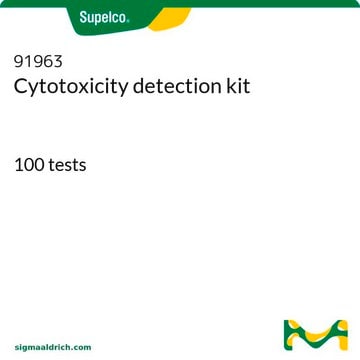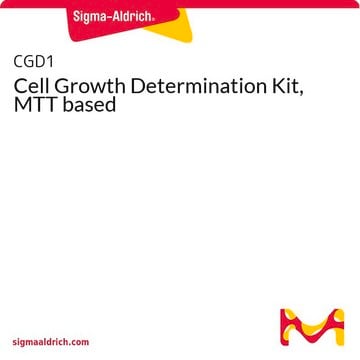TOX7
In Vitro Toxicology Assay Kit, Lactic Dehydrogenase based
Synonyme(s) :
LDH cytotoxicity assay
Se connecterpour consulter vos tarifs contractuels et ceux de votre entreprise/organisme
About This Item
Code UNSPSC :
12352207
Nomenclature NACRES :
NA.84
Produits recommandés
Forme
liquid
Niveau de qualité
Utilisation
kit sufficient for 500 tests
Conditionnement
pkg of 1 kit
Conditions de stockage
dry at room temperature
Technique(s)
protein quantification: suitable
λmax
490 nm
Application(s)
cell analysis
detection
Méthode de détection
colorimetric
Température de stockage
−20°C
Description générale
Tox7 is a member of Sigma′s CytoToxicity Kit series. It is based on the measurement of lactate dehydrogenase (LDH) release from cells as a measure of cell membrane damage and cytotoxicity. This technique has been utilized as an alternative to 51Cr release for cell mediated cytotoxicity assays, as well as conventional cytotoxicity resulting from interaction of a test material with the cell.
Application
In Vitro Toxicology Assay Kit, Lactic Dehydrogenase based has been used:
- to detect lactate dehydrogenase release in human umbilical vein endothelial cells (HUVECs) and human cardiac myocytes (HCMs) for lactate dehydrogenase (LDH) assay
- to determine the activity of lactate dehydrogenase leakage of MDA-MB-231 cells
- to examine the activity of LDH in RAW 264.7 cells , in LDH cytotoxicity assay in human cell lines
- for spectrophotometric measurement of viable cells. Absorbance of converted dye is measured at a wavelength of 490 nm.
Actions biochimiques/physiologiques
The lactate dehydrogenase assay is a means of measuring either the number of cells via total cytoplasmic lactate dehydrogenase (LDH) or membrane integrity as a function of the amount of cytoplasmic LDH released into the medium. This method is simple, accurate and yields reproducible results. The assay is based on the reduction of NAD by LDH. The resulting reduced NAD (NADH) is utilized in the stoichiometric conversion of a tetrazolium dye to a soluble, colored formazan derivative.
.
.
Mentions de danger
Conseils de prudence
Classification des risques
Aquatic Chronic 3
Code de la classe de stockage
10 - Combustible liquids
Certificats d'analyse (COA)
Recherchez un Certificats d'analyse (COA) en saisissant le numéro de lot du produit. Les numéros de lot figurent sur l'étiquette du produit après les mots "Lot" ou "Batch".
Déjà en possession de ce produit ?
Retrouvez la documentation relative aux produits que vous avez récemment achetés dans la Bibliothèque de documents.
Les clients ont également consulté
Cytotoxicity of biologically synthesized silver nanoparticles in MDA-MB-231 human breast cancer cells
Gurunathan S, et al.
BioMed Research International (2013)
Riboflavin deprivation inhibits macrophage viability and activity-a study on the RAW 264.7 cell line
Mazur-BAI, et al.
The British Journal of Nutrition, 110(3), 509-514 (2013)
Chia-Hui Lin et al.
International journal of molecular sciences, 21(7) (2020-04-12)
Since their invention, periodic mesoporous organosilicas (PMOs), an innovative class of materials based on organic as well as inorganic hybrid nanocomposites, have gathered enormous interest owing to their advantageous physicochemical attributes over the pristine mesoporous silica nanoparticles (MSNs). To further
Katarzyna Walczak et al.
International journal of molecular sciences, 21(21) (2020-10-30)
Tryptophan metabolites: kynurenine (KYN), kynurenic acid (KYNA) and 6-formylindolo[3,2-b]carbazole (FICZ) are considered aryl hydrocarbon receptor (AhR) ligands. AhR is mainly expressed in barrier tissues, including skin, and is involved in various physiological and pathological processes in skin. We studied the
Effects of 5-fluorouracil on morphology, cell cycle, proliferation, apoptosis, autophagy and ROS production in endothelial cells and cardiomyocytes
Focaccetti C, et al.
Testing, 10, e0115686-e0115686 (2015)
Notre équipe de scientifiques dispose d'une expérience dans tous les secteurs de la recherche, notamment en sciences de la vie, science des matériaux, synthèse chimique, chromatographie, analyse et dans de nombreux autres domaines..
Contacter notre Service technique



